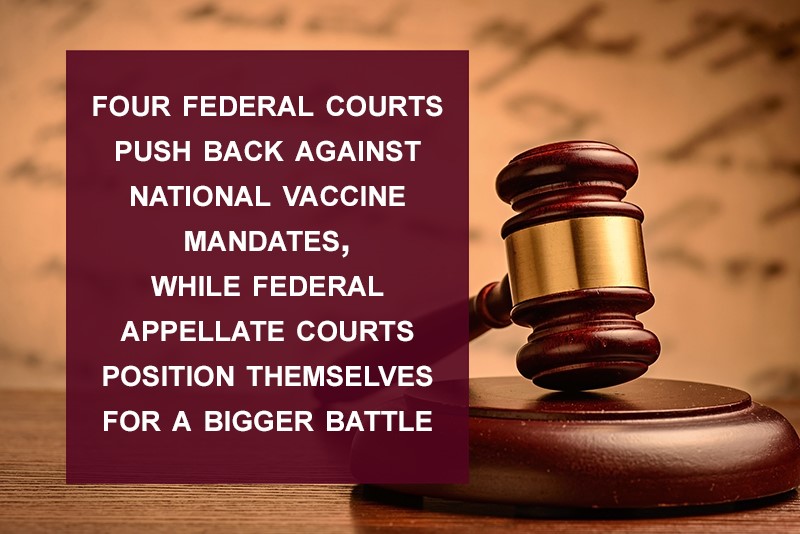

President Biden’s attempt to impose various nationwide vaccine mandates was an escalation of the war on states’ rights and individual freedoms during COVID-19. Never has the federal government claimed such authority, and in four new cases, federal District Courts, located in state federal districts, are fighting back.
Power and Jurisdiction Between Federal and State Government
On November 17, we reported that on November 12th, a federal court, the Fifth District Court of Appeals, issued a temporary stay in the BST Holdings v. OSHA case, preventing the federal government from enforcing the large-employer vaccine-or-testing mandate. Key issues were that the federal government has no general power over health and safety and also that OSHA did not have clear authority for its action. In a phrase also used in some of the newer court rulings, Judge Kurt D. Engelhardt called the rule a, “one-size-fits-all sledgehammer” approach. He also noted that it appears, “the true purpose is not to enhance workplace safety, but instead to ramp up vaccine uptake by any means necessary.”
Following the 5th District case, several other legal challenges to the OSHA rule were later rolled into one and the federal Ohio-based Sixth Circuit Court was selected via lottery to hear the consolidated lawsuits. On December 3rd the Sixth Circuit Court’ rule denied the Biden administration requests to lift the stay.
Since the original 5th District opinion, four new federal cases have struck down federal mandates relating to Covid-19.
Federal Contractor Mandates Struck Down
Two federal trial courts have found the requirement that all employees of entities which get federal contracts be vaccinated is unlawful. On November 30, in Kentucky v. Biden, the US District Court in Kentucky issued a ruling granted a preliminary injunction against the mandate. The court said that the rule exceeded the president’s authority and also violates states’ rights. The injunction applies in the suing states Kentucky, Ohio, and Tennessee. The court noted that about 1/5 of US workers are involved in federal contracts or subcontracts, and said that the President cannot use his authority to manage federal procurement to impose a vaccine mandate. Per the judge, this rule is more of a public health measure that an economic efficiency rule, and it unlawfully gives the executive branch “unfettered” power. Last, the court also said that there was an insufficient nexus between the goals of the Procurement Act and the vaccine mandate.
Then on December 7, in Georgia v. Biden, the US District Court in Georgia issued a similar injunction. The plaintiffs include six states, several governors, state agencies, and two contractor associations all trying to defend the individual workers and firms whose rights are at risk. Judge R. Stan Baker first noted that, “even in times of crisis this court must preserve the rule of law” and also found that the suing parties were likely to succeed in showing that the president exceeded his authority under the Federal Procurement and Administrative Services Act. Based partly on testimony showing that three universities who together rely on about $737 million in contracts would be burdened by the mandate, Judge Baker said that compliance would be, “costly, laborious and likely to result in a reduction in available members of the workforce.”
As in the OSHA case, he also emphasized that there must be a clear statement from Congress to support an exercise of powers involving “vast” political and economic significance. Practically speaking, the judge said that the mandate, “operates as a regulation of public health” as opposed to procurement. He also noted that not issuing an injunction would create large burdens for unvaccinated workers and lead to the irreparable injury of complying with an illegal law. Last, since plaintiff Associated Builders and Contractors, Inc has members nationwide, the injunction covers the entire USA.
Medicare and Medicaid Mandates Struck Down
Rulings from US District Courts in Missouri and Louisiana, from November 29 and November 30, shot down the Medicare mandate with similar arguments to the contractor mandate cases. In Missouri v. Biden an injunction now covers 10 states, and in Louisiana v. Becerra all of the remaining states are included in the court order.
Missouri v. Biden
In Missouri the court found that congress did not grant authority sufficient to mandate the COVID-19 vaccination. The judge said that the Medicare mandate violates the requirements for granting powers of vast significance, alters the state-federal balance of power, and delegates power at the “outer limits” of congressional authority. Judge Matthew T. Schelp said the mandate would cost about $1.38 billion to comply with and may lead to the closure of medical facilities and the loss of large numbers of workers. He also opined that, “It would be difficult to identify many other issues that have more political significance at this time.” He further said that a healthy balance of power between the states and the federal government will, “reduce the risk of tyranny and abuse from either front.” And the failure to include a notice-and-comment period, “undermines the democratic process.” Further, the rule is arbitrary, e.g., it did not consider weekly testing or natural immunity as safety options.
Louisiana v. Becerra
In Louisiana v. Becerra Judge Terry A. Doughty noted that the mandate covers 21 different types of healthcare providers and said that the evidence showed that 10.3 million workers would be affected by the rule and that 2.4 million of these folks are unvaccinated. He also offered that the largest COVID-19 surge was from October 2020 to February 2021 and that cases have fallen since then. Doughty referred to BST Holdings v. OSHA as presenting “almost identical issues”: granting powers beyond what the constitution allows, finding an “emergency” in a two-year-old problem, and the irreparable harm of forcing people to choose between their job and taking a vaccine. And the loss of constitutional freedom for even a minimal time is an irreparable injury. Judge Doughty ruled that the mandate was unlawfully arbitrary is part because the evidence in Louisiana showed that it would lead to an exodus of workers and thereby harm and not help patients.
And he noted that while the government alleged that natural immunity is inadequate, the actual evidence presented showed that it is as good as or better than the available vaccines. He also said that if we need a “booster” in six months, the vaccine is not looking that effective, so why mandate it? Doughty also credited evidence from Dr. Peter McCullough that our Delta variant problem is likely due to the vaccines, along with noting that the fully vaccinated still get COVID-19: “Mandatory vaccines as the only method of prevention makes no sense.” Also, the mandate never mentioned Biden’s September announcement of his plan, so legally speaking it is pretextual and thereby arbitrary.
On the Other Hand, Florida 11th Circuit Court of Appeals Upheld
Medicare/Medicaid Mandates
On December 6, in Florida v. DHHS, the federal 11th Circuit Court of Appeals issued a ruling by Judges Rosenbaum and Pryer that upheld Medicare and Medicaid mandates by upholding a trial court’s denial of a preliminary injunction over the Medicare and Medicaid mandate. Seemingly in a different factual universe from Judge Doughty in the Louisiana case, the Appeals court said that COVID-19 was the “deadliest disease in American history” despite the illness’ very high survival rate and the toll of other scourges like cancer and heart disease. Here, different facts from the former opinions were presented and believed at the Florida trial court level. The Florida trial court had decided that the evidence that folks would quit the health-care industry (and impact care) was “speculative.” And on appeal, the reviewing court is supposed to stick to the facts found at the lower trial court level.
The complexity of cases going forward in different courts across the country is an issue all of its own. The 11th Circuit court noted that the Louisiana case granted a nation-wide injunction on mandates and had arguably made their 11th Circuit case “moot”. But they proceeded on the Appeal anyway noting that it is “the 5th Circuit’s job” to hear any challenge to Louisiana. On the merits, they say COVID-19 is a “transmissible and highly deadly” disease, and the mandate is similar to existing Medicare/Medicaid rules for infection prevention. Missing the point that the states are the only ones with a general power over health issues, they cite the 1905 Jacobson case as justifying the mandate, yet that prior case was looking at the rights of states in particular.
Health Freedom Going Forward
In our work for health freedom, we need to keep in mind that each legal case is a unique tussle of real facts versus “official narratives” and a unique opportunity to tell truth to power. Key to keep in mind, appeals courts are supposed to lean toward upholding the lower court, often asking if they “abused their discretion.” Also, the four positive trial court rulings are not legally binding beyond the parties, yet they can be a roadmap for other plaintiffs, judges, and the public. How our current split in decisions will play out is not known, but the struggle continues.
As these cases show, we need to keep up our efforts to inform and educate ourselves and others as to the facts of the COVID-19 pandemic and vaccines. And while “taking on the science” is not usually the most effective route for health freedom advocacy, here the judges had an open mind about the facts and science, as well as the role of government in our lives, and the unique role of states in protecting the fundamental health freedoms of individuals. This is a great step in the right direction. As we look toward the New Year, NHFC will continue to advocate and educate to further our goal of health freedom in the USA. And in these crazy times, we will continue to keep you informed on the important legislation and legal cases bearing on our basic human right to decide what goes in our body.
Now more than ever it is important that we use the tools that are available to us as Americans.
Your donation makes a huge difference in our ability to educate, foster and mobilize with people like you in states across the country.
Together we can create the laws “we wish to see in the world”. Laws that protect our rights to make choices about our own health and the health of our children.
Donate by Credit Card, Paypal or by mail
NHFA is a 501(c)4 lobbying organization, therefore your donations are not tax deductible.
RECENT NEWS


EPA Deregulation of Clean Air and Water: does it go too far?


